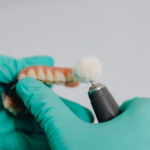For many people, going to the dentist can be a daunting and anxiety-inducing experience. While dental health is an essential part of overall health and well-being, the fear of going to the dentist can prevent people from seeking the dental care they need. In this blog post, we will explore some of the reasons why people fear going to the dentist and what can be done to help alleviate these fears.
Fear of Pain
One of the most common reasons people fear going to the dentist is the fear of pain. Many people have had negative experiences with dental procedures that were painful, and the thought of experiencing pain again can cause significant anxiety. While modern dental procedures are generally much less painful than in the past, the fear of pain can still be a barrier for some people.
Fear of Loss of Control
Another reason people may fear going to the dentist is a fear of loss of control. When lying down in the dentist’s chair, patients may feel vulnerable and out of control, which can be a triggering experience for some. This fear can be particularly challenging for people who have experienced trauma in the past, such as sexual assault or physical abuse.
Fear of Judgement
For many people, going to the dentist can be a source of embarrassment. People may feel ashamed or embarrassed about the state of their teeth or their oral hygiene habits. The fear of being judged by the dentist or dental hygienist can be a significant barrier to seeking care, particularly for people with dental anxiety.
Fear of the Unknown
Finally, many people fear going to the dentist simply because they do not know what to expect. Dental procedures can be unfamiliar and intimidating, and the fear of the unknown can be a significant barrier to seeking care. Additionally, some people may be afraid of the sounds and smells associated with dental procedures, which can contribute to their anxiety.
What Can Be Done to Help Alleviate Dental Anxiety?
There are several strategies that can help alleviate dental anxiety and make going to the dentist a less stressful experience. First, finding a dentist who understands and is empathetic to dental anxiety can make a big difference. Many dentists specialize in treating patients with dental anxiety and can provide a more compassionate and supportive environment.
Second, using relaxation techniques such as deep breathing or meditation can help calm nerves and reduce anxiety. Some dentists may also offer sedation options, such as nitrous oxide or oral sedatives, to help patients feel more relaxed during procedures.
Finally, education and communication can go a long way in reducing dental anxiety. Dentists can take the time to explain procedures and answer any questions patients may have, helping to demystify the dental experience. Additionally, dentists can work with patients to develop a plan for addressing any oral health concerns, helping to reduce the fear of the unknown.
In conclusion, dental anxiety is a common experience for many people, but it should not prevent them from seeking the dental care they need. By understanding the root causes of dental anxiety and working with a supportive dental team, patients can overcome their fears and maintain good oral health.








